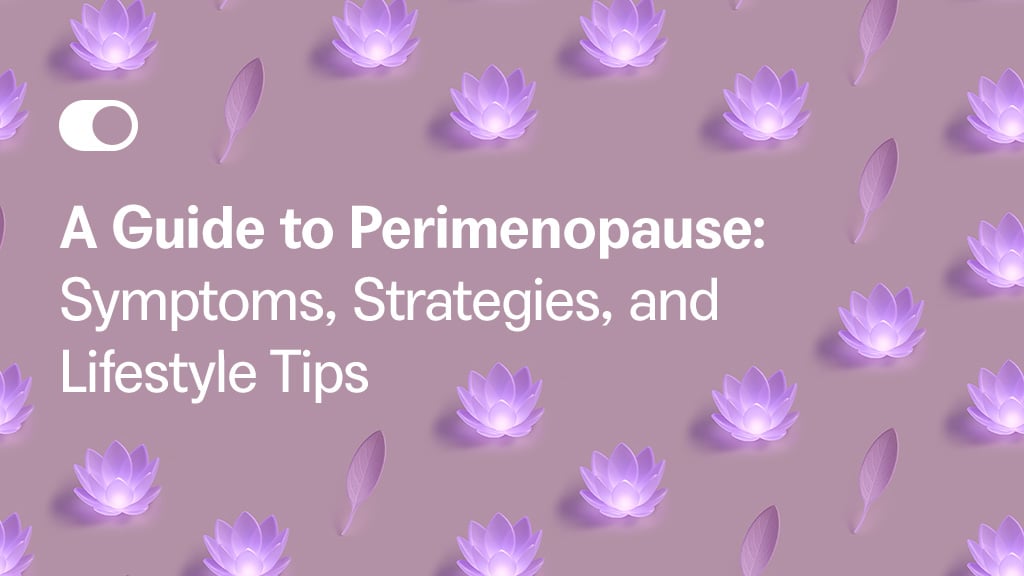
A Guide to Perimenopause: Symptoms, Strategies, and Lifestyle Tips
Simply put, perimenopause is the stage before menopause, when estrogen and progesterone levels start to decline. Hormonal changes in perimenopause—beginning anywhere from the late 30s-to-mid 40s—can trigger challenging symptoms: Cue the hot flashes, sleep disruptions, and mood shifts.
While a natural part of aging, understanding these changes, and addressing both the physical and emotional effects can help you stay in control of your health and well-being. Below, learn about early menopause indicators, common symptoms, and lifestyle tips for the menopause transition.

What Exactly Is Perimenopause?
Perimenopause, also known as menopausal transition, is the phase leading up to menopause, which is officially marked by 12 consecutive months without a menstrual period (unrelated to other health conditions). This stage, defined by fluctuating reproductive hormones and increasingly irregular cycles, usually begins between ages 45 and 55, and generally lasts four to seven years. For some, however, it can stretch on even longer.
There are several factors that may influence the timing of perimenopause. Smoking, a family history of early menopause, and certain cancer treatments (including chemotherapy and pelvic-radiation therapy) can lead to an earlier onset. Additionally, a hysterectomy can bring on menopause if one or both ovaries are also removed or stop functioning.
Common Perimenopause Signs and Symptoms
There’s no simple test that can predict or confirm perimenopause. But most women recognize the shift through their symptoms. Undeniably, everyone’s journey is unique, but 80% of women are affected by some combination of:
Physical Symptoms
Menstrual Changes: Periods often become unpredictable and irregular, with changes in duration, frequency, and flow.
Hot Flashes and Night Sweats: Sudden, intense feelings of heat and sweating are classic vasomotor symptoms. Also common: flushed skin, rapid heartbeat, anxiety, and a chilled feeling as flashes subside.
Sleep Problems: Difficulty falling or staying asleep is typical and can be exacerbated by night sweats (nighttime hot flashes).
Vaginal Dryness and Bladder Issues: Low estrogen levels often decrease vaginal lubrication and elasticity, bringing discomfort during intercourse, as well as infections and incontinence.
Weight Changes: Many women have a tendency for weight gain, bloating, and weight redistribution particularly around the abdomen (aka, Meno belly).
Bone Loss: As estrogen levels drop, bones can break down faster than they rebuild, raising the risk of osteoporosis.
Emotional/Cognitive Changes
Mood Fluctuations: Hormonal shifts can contribute to increased irritability, anxiety, and feelings of sadness.
Cognitive Challenges: It’s normal for women to experience brain fog, and difficulty with memory and concentration.
Increased Stress Sensitivity: Stress tolerance and coping skills can be reduced.

Perimenopausal Health Management Strategies
Let’s be real: Perimenopause can be tough for most women. But simply gritting your teeth and pushing through isn’t the answer. Taking a proactive, whole-body approach to your health and wellness can help you manage symptoms more effectively, so you feel balanced, supported, and back in control.
Empowering Lifestyle Choices
Small lifestyle changes can make a big difference in how you feel. The first step? Identify your triggers. Hot flashes, for instance, can be sparked by hot weather, smoking, caffeine, spicy foods, alcohol, sugar, tight clothing, or stress. Once you know what sets off your symptoms, you can take steps to avoid them. Other daily habits to help manage symptoms:
Good Nutrition: Focus on a balanced diet of whole foods, lean proteins, and healthy fats to support hormonal balance. Include calcium- and vitamin D-rich foods to protect bone health.
Consistent Physical Activity: Regular movement (like strength training, walking, or yoga) can reduce hot flashes, boost mood, help maintain a healthy weight, and preserve bone density.
Healthy Weight: Excess weight is linked to more frequent and intense hot flashes; weight loss can help ease symptoms.
Quit Smoking: Smoking increases cardiovascular risks after menopause and often worsens hot flashes.
Temperature Control: Keep rooms cool, wear light clothing, and use a fan at night to reduce heat-related discomfort.
Stress Management: Mindfulness, meditation, and breathwork can help stabilize mood, and reduce emotional swings.
Mental Health Support: Perimenopause can affect emotional well-being; consider therapy or counseling when needed.
Explore Clinical Options
If perimenopausal symptoms are severe and disrupting your daily life, it’s worth exploring additional treatment options. Hormone therapy remains the most effective way to ease hot flashes, mood changes, and other common symptoms. Alternatively, non-hormonal medications and targeted supplements may also offer relief for those who prefer not to use hormones. Talk with your Primary Care provider to determine the safest, most effective approach for your particular needs.
Understanding the changes your body is going through and taking proactive steps to support your physical, mental, and emotional health are essential to navigating perimenopause with confidence. At Crossover Health, we’re here to partner with you every step of the way, providing the care and support you need to feel your best. You’ve got this!
Have questions about perimenopause or menopause? Make an appointment with your Primary Care provider to address your needs and come up with a personalized plan, and/or connect with a Mental Health provider if you need support.